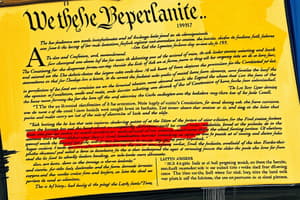Podcast
Questions and Answers
What does the 1st Amendment protect?
What does the 1st Amendment protect?
- Freedom of speech (correct)
- Protection against unreasonable searches
- Right to bear arms
- Right to a fair trial
What does the 2nd Amendment protect?
What does the 2nd Amendment protect?
An individual's right to bear arms
What does the 3rd Amendment prohibit?
What does the 3rd Amendment prohibit?
Forced quartering of soldiers during peacetime
What does the 4th Amendment prohibit?
What does the 4th Amendment prohibit?
What rights are provided by the 5th Amendment?
What rights are provided by the 5th Amendment?
What does the 6th Amendment protect?
What does the 6th Amendment protect?
What does the 7th Amendment provide for?
What does the 7th Amendment provide for?
What does the 8th Amendment prohibit?
What does the 8th Amendment prohibit?
What rights does the 9th Amendment protect?
What rights does the 9th Amendment protect?
What does the 10th Amendment limit?
What does the 10th Amendment limit?
Study Notes
First Amendment
- Safeguards freedom of speech, religion, and press.
- Grants the right to assemble peacefully and petition the government.
Second Amendment
- Ensures the individual right to bear arms for self-defense.
Third Amendment
- Prohibits the involuntary quartering of soldiers in private homes during peacetime.
Fourth Amendment
- Protects against unreasonable searches and seizures.
- Establishes the need for search warrants based on probable cause.
Fifth Amendment
- Requires indictment by a grand jury for serious crimes.
- Protects against self-incrimination and double jeopardy (being tried twice for the same offense).
- Guarantees due process and addresses eminent domain.
Sixth Amendment
- Affirms the right to a fair and speedy public trial by an impartial jury.
- Ensures individuals are informed of charges, can confront witnesses, and have the right to legal counsel.
Seventh Amendment
- Provides the right to a jury trial in civil cases that exceed a certain monetary threshold, following common law traditions.
Eighth Amendment
- Prohibits excessive bail and fines.
- Forbids cruel and unusual punishment.
Ninth Amendment
- Clarifies that the enumeration of certain rights in the Constitution does not deny or disparage others retained by the people.
Tenth Amendment
- Restricts federal government powers to those specifically granted by the Constitution.
- Reserves any powers not delegated to the federal government to the states or the people.
Studying That Suits You
Use AI to generate personalized quizzes and flashcards to suit your learning preferences.
Description
Test your knowledge of the first ten amendments of the US Constitution with this engaging flashcard quiz. Each card features a specific amendment along with its key definition, helping you understand the foundational rights guaranteed to American citizens.




